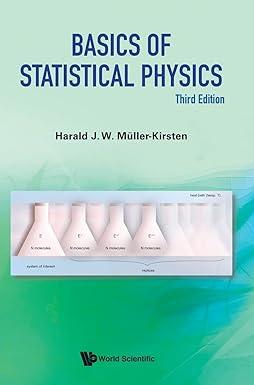Example 6.14: Classical diatomic perfect gas Consider a perfect gas consisting of diatomic molecules. Write down the
Question:
Example 6.14: Classical diatomic perfect gas Consider a perfect gas consisting of diatomic molecules. Write down the Lagrangian function L of a single molecule of moment of inertia I. Let the harmonic vibrations of the two atoms along the axis and about an equilibrium position η0 be described by the coordinate x(t) = η(t) − η0, and the sum of kinetic and potential parts of the vibrations by Lvib = (m/2)(x˙2 − ω2x2), where m0 is the reduced mass of the two atoms and ω a constant. Write down the Hamilton function and count the number of quadratic terms. Then obtain the specific heat CV per particle in this purely classical consideration with the help of the law of equipartition of energy. (Answer: CV = 7k/2).
Fantastic news! We've Found the answer you've been seeking!
Step by Step Answer:
Related Book For 

Question Posted:






